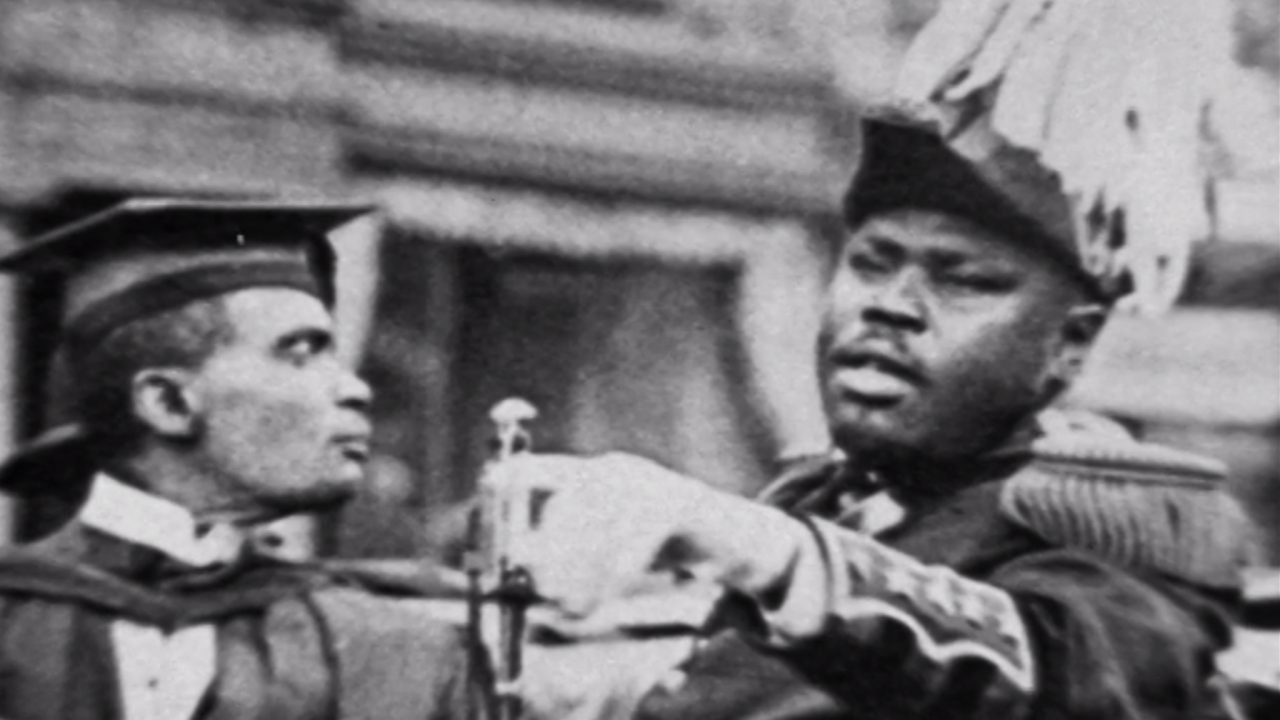
Celebrating BHM with a Look Back at Three Pioneering Filmmakers | Curator’s Perspective
Celebrating BHM with a Look Back at Three Pioneering Filmmakers | Curator’s Perspective
Claire Prieto, Roger McTair and Jennifer Hodge de Silva were the first Black artists in Canada to create films depicting Black Canadian experiences and perspectives. All three began making films during the 1970s, and their collective body of work contains some of the most significant and enriching contributions to the history of Canadian cinema.
To commemorate Black History Month and celebrate Roger McTair’s 80th birthday in 2024, this instalment of Curator’s Perspective will be shining a spotlight on the films of these three key figures in the birth and evolution of Black filmmaking in Canada and at the NFB. And, towards the end of this blog post, I’ll share a recent discovery about the role a reggae superstar, Leroy Sibbles, played in the making of an NFB film.
But let’s start from the beginning.
Claire Prieto: Director, Producer and Mentor/Activist

The work of TV and film producer, director and distributor Clarie Prieto was vital to the emergence and growth of Black Canadian cinema. In 1975, she produced the short doc Some Black Women, the first film by a Black Canadian filmmaker about the Black community in Canada, focusing on the experiences of Black women. Prieto also played an important role in the Black Film and Video Network, whose goal, as she put it, was “to encourage and promote the development, production and distribution of the work of Black film and video-makers in Canada.”[i] Her first NFB film, Black Mother, Black Daughter (1988, co-directed with Sylvia Hamilton), was one of the first NFB production ever created by an all-female crew. It chronicles the lives of Black women in Nova Scotia, their contributions to the home, the church and the community, and the strengths they pass on to their daughters.
Black Mother Black Daughter, Sylvia Hamilton et Claire Prieto, offert par l’Office national du film du Canada
In addition to producing Canadian films with a focus on Black perspectives, including It’s Not an Illness (1979), Prieto co-produced the big budget American movie How She Move (2007) and the first Black Canadian TV sitcom, the award-winning Lord Have Mercy! (2003). Her devotion to developing and supporting Black cinema and Black Canadian filmmakers earned her a Lifetime Achievement Award from Toronto’s Caribbean Tales Film Festival in 2010. I invite you to watch her second NFB film, Older, Stronger, Wiser (1989), a short documentary in which five Black women talk about their lives in rural and urban Canada between the 1920s and 1950s, produced by the NFB’s iconic Studio D.
Older Stronger Wiser, Claire Prieto, offert par l’Office national du film du Canada
Roger McTair: Writer, Teacher and Pioneering Black Film Director

Writer and filmmaker Roger McTair’s work has been fundamental to the development of Black Canadian arts and culture. McTair studied English Literature and Film at York University in Toronto and worked as an English professor at Seneca College for 18 years. He’s published several collections of poetry and short fiction stories that explore themes of identity, culture, history and belonging in the Caribbean and Canadian contexts.
McTair directed Some Black Women (1975, produced by Prieto, as noted above), as well as Different Timbres (1980, also produced by Prieto), which “examines steel drum production, education, performance and cultural influence in Ontario in the 1970s and 1980s;”[ii] and Home to Buxton (1987, co-directed with Prieto), which looks at “the history of the Black community of Buxton, Ontario… [it] includes interviews with Buxton residents about family history, town history, farming, and the community.”
McTair also directed Children Are Not the Problem: An Anti-Racist Childcare Strategies Film (1991) and the NFB film Journey to Justice (2000), which pays tribute to a group of Canadians who took racism to court. I urge you to watch this powerful feature-length documentary that captures the struggles of six people, from the 1930s to the 1950s, who refused to accept inequality. Featured here are Canada’s unsung heroes in the fight for Black civil rights: brave pioneers who helped find justice for Canadians.
Journey to Justice, Roger McTair, provided by the National Film Board of Canada
Jennifer Hodge de Silva: The First Black Filmmaker at the NFB
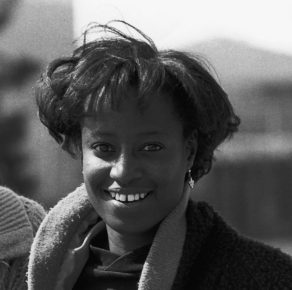
Jennifer Hodge de Silva (born Jennifer Hodge in 1951 in Montreal) was the first Black filmmaker to direct an NFB film about the Black community’s perspectives and experiences. She was the daughter of Mairuth Hodge Sarsfield, a Canadian activist, diplomat, journalist, researcher, television personality, broadcaster, civil servant and best-selling author.[iii] Hodge de Silva was immersed in the arts and culture throughout her childhood and received a cosmopolitan education: she completed high school in Switzerland and became fluent in French and German, and proficient in Italian.[iv]
She went on to earn a Bachelor of Arts (Honours) in Fine Arts from Glendon College at Toronto’s York University in 1974 and a BFA in Television Arts from the Ryerson Polytechnic Institute (Toronto Metropolitan University) in 1979. While completing her BFA, Hodge de Silva received her first professional credit at the NFB, as associate producer/production coordinator on Macartney-Filgate’s Fields of Endless Day (1978).
Fields of Endless Day, Terence Macartney-Filgate, provided by the National Film Board of Canada
This film was added to nfb.ca this month as part of BHM 2024 celebrations, in an effort to showcase Hodge de Silva’s complete body of work at the NFB. Fields of Endless Day is a rare NFB docudrama that seeks to uncover the “roots” of Canada’s Black population, from the 17th century through to the first half of the 20th century, tracing the history of their struggles and triumphs over a period of almost 375 years. The film offers invaluable insights and information on notable Black figures who helped shape Canadian history, such as Mathieu Da Costa, John Ware and Marcus Garvey, and its score was composed and arranged by internationally acclaimed Black Canadian musicians Oscar Peterson and Rick Wilkins.
One year later, Hodge de Silva directed her first NFB film, Canada Vignettes: Helen Law (1979), a portrait of a Chinese immigrant to Canada, as witnessed through the eyes of her son, a first-generation Canadian (just added to nfb.ca this month to mark BHM 2024).
Helen Law, Jennifer Hodge, provided by the National Film Board of Canada
In the following years, Hodge de Silva directed three more documentaries: Toronto’s Ethnic Police Squad (1979), a look at the Toronto police department’s ethnic-relations unit;[v] Myself, Yourself (1980), in which three adults and two teenagers speak about what it’s like to grow up being viewed as different because of race, culture or religion;[vi] and Joe David: Spirit of the Mask (1982), which follows the creative process of the acclaimed West Coast Indigenous artist.[vii] In 1982, Hodge de Silva married fellow filmmaker Paul de Silva and together they founded the production company Jenfilms Inc., whose projects included the TV series Inside Stories (1989), a chronicle of the experiences of ethnically diverse residents of Toronto, and the multi-awarded and acclaimed series Neighbourhoods.
Hodge de Silva’s next and—sadly—last film for the NFB was Home Feeling: Struggle for a Community (1983, with additional direction by McTair),[viii] which explores the troubled relations between the Toronto Police Service and residents of the city’s Jane and Finch area, focusing on members of the Jamaican, Grenadian and Guyanese communities (discussed in detail in my previous Curator’s Perspective on Black Canadian cinema, which you can read here).
Home Feeling: Struggle for a Community, Jennifer Hodge & Roger McTair, provided by the National Film Board of Canada
Reggae Legend Leroy Sibbles at the NFB
I recently discovered a wonderful fact about Home Feeling that I’d like to share with you: much of the film’s soundtrack was composed by Jamaican reggae legend Leroy Sibbles. Born in Trench Town, Jamaica, in 1949, Sibbles has been referred to as the greatest all-around talent in reggae history.[ix] A composer, bassist, arranger and producer, he was also the lead singer for the influential ska/rocksteady/reggae group the Heptones, which recorded with all the major golden age producers, i.e., the renowned Clement “Coxsone” Dodd, Lee Scratch Perry, Joe Gibbs, etc. Sibbles was one of the main creative minds behind Studio One, which helped launch the musical career of other Jamaican superstars, including Horace Andy, Ken Boothe and Burning Spear. Sibbles is known for his contributions to reggae classics such as “Satta Massagana” and “Declaration of Rights” by the Abyssinians, “Door Peep (Shall Not Enter)” by Burning Spear and the instrumental “Full Up” (which inspired later hits “Pass the Kouchie” by the Mighty Diamonds and “Pass the Dutchie” by Musical Youth)—and now, for his contribution to the first NFB film by a Black Canadian filmmaker to chronicle Black Canadian experiences.
Though his name was spelled incorrectly (as “Sibblis”) in the film’s credits (00:56:50–00:57:00), looking at the original documents in the film’s file in the NFB’s archives (see images below), there can be no doubt that Sibbles was responsible for the music.
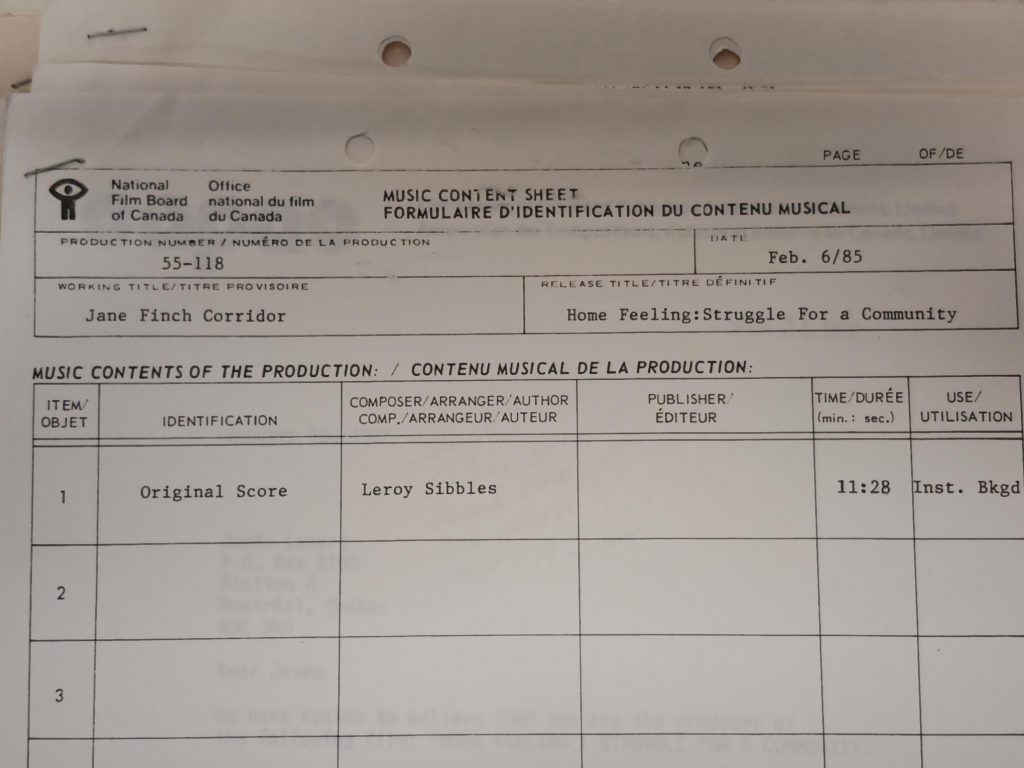
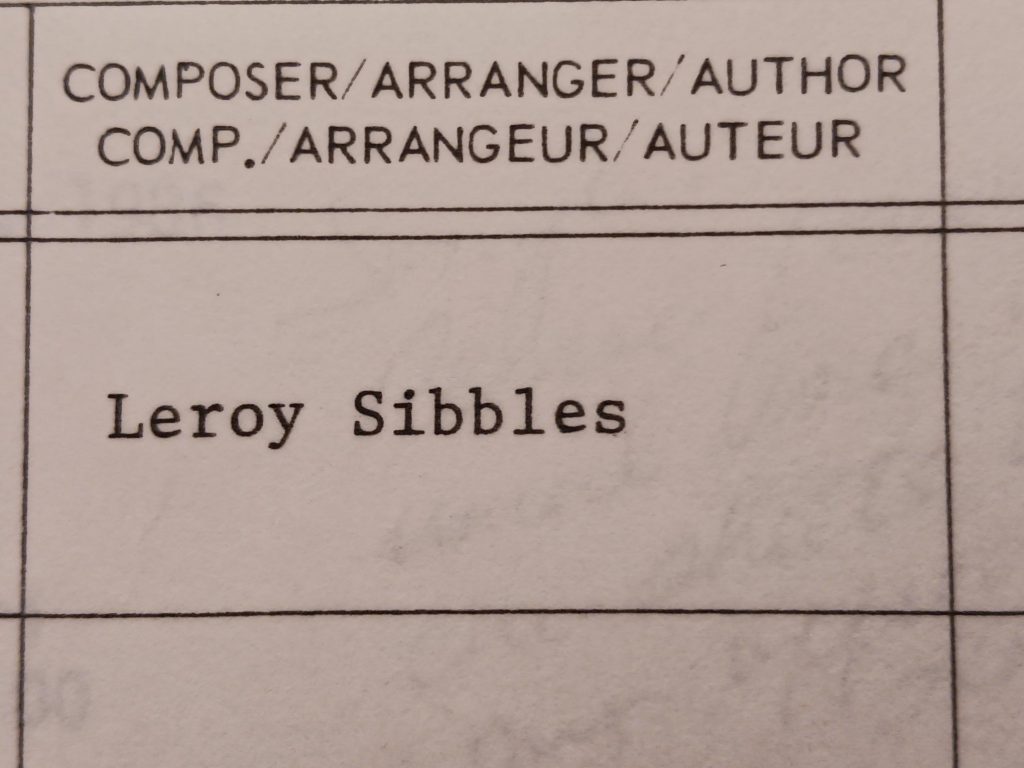
As you can see, Sibbles was credited as composer/arranger/author of the original score for Jane Finch Corridor (the working title for Home Feeling). Knowing that he composed the music for this great film makes it even more intriguing to watch and further illustrates the important role that artists from the Caribbean played in Black Canadian cinema. Sibbles was credited for a total of over 11 minutes of the score; for fans of his music, here’s a detailed list of the pieces he composed:
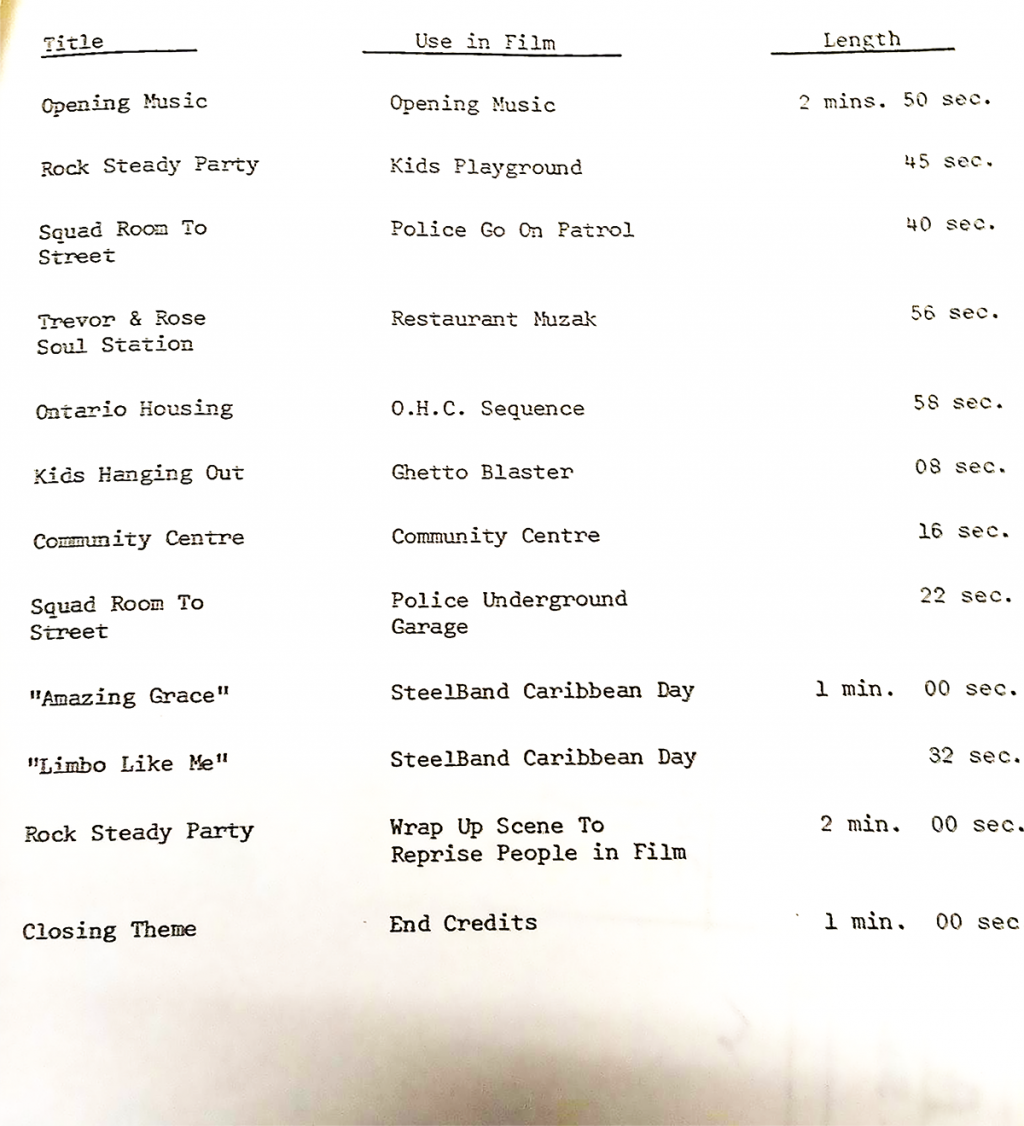
Celebrating Trailblazing Filmmakers During Black History Month
Claire Prieto, Roger McTair and Jennifer Hodge de Silva’s acclaimed and influential body of work has been widely screened at retrospectives and taught in film, cultural studies and critical race studies courses, throughout Canada and around the world. Hodge de Silva died of cancer in 1989 at the tragically young age of 38, and Prieto and McTair paid tribute to her life and work with Jennifer Hodge: The Glory and the Pain (1992).
Hodge de Silva’s work, however, as well as the work of the other trailblazers discussed in this post, lives on. There will be plenty of events taking place across Canada to mark Black History Month, including two film screenings in Vancouver co-organized by the NFB and UBC, which I programmed and will be attending: one on February 1 in the Norm Theatre (https://las.arts.ubc.ca/events/event/film-screening-black-soul-2000-and-stateless-2020/), and the other on February 29 in Robson Square (https://publichumanities.ubc.ca/events/event/black-history-month-film-screening/. Hopefully we’ll all take advantage of events like these to gather and celebrate the work of these and other great artists throughout the month of February.
[i] Amanda Parris, “An oral history of the Black Film and Video Network,” CBC News, May 8, 2020, https://www.cbc.ca/arts/an-oral-history-of-the-black-film-and-video-network-1.5559797
[ii] Archives of Ontario, https://www.youtube.com/watch?v=Su35kRo5sDo
[iii] Ron Fanfair, “Mairuth Sarsfield wrote eloquently about Black multiculturalism,” January 7, 2017, https://www.ronfanfair.com/home/2017/1/7/mairuth-sarsfield-wrote-eloquently-about-black-multiculturalism
[iv] Leslea Kroll, “Jennifer Hodge de Silva,” The Canadian Encyclopedia, December 3, 2007, https://www.thecanadianencyclopedia.ca/en/article/jennifer-hodge-de-silva
[v] Canadian Women Film Directors Database, http://femfilm.ca/film_search.php?film=hodge-de-silva-torontos&lang=e
[vi] BLACK ON SCREEN: Images of Black Canadians 1950s–1990s, Montreal: Studio D, The Women’s Studio of the National Film Board, 1992
[vii] Canadian Women Film Directors Database, http://femfilm.ca/film_search.php?film=hodge-de-silva-joe&lang=e
[viii] Canadian Women Film Directors Database, http://femfilm.ca/director_search.php?director=jennifer-hodge-de-silva&lang=e
[ix] Kevin O’Brien Chang and Wayne Chen, Reggae Routes: The Story of Jamaican Music (1998). Philadelphia: Temple University Press, p. 181.
Header Image: Fields of Endless Day (1978) by Terence Macartney-Filgate

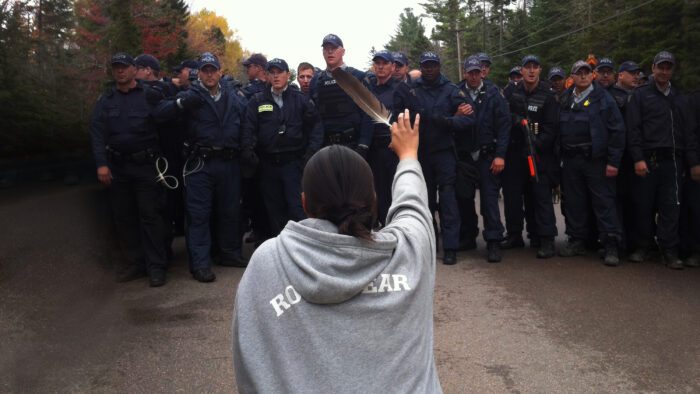
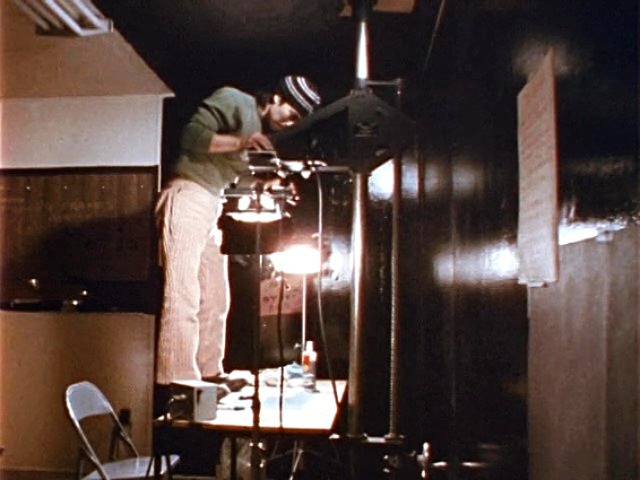
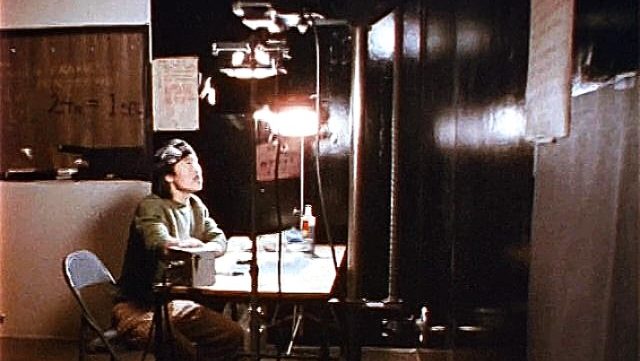
Thank you for putting together this fascinating compilation of Black filmmaking in Canada!